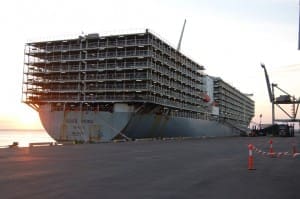JBS’s Townsville export beef plant has postponed its scheduled seasonal start from February 29 to at least the end of March. No beef plant in Australia is as heavily exposed to the booming live export trade, and in this opinion piece, the Australian Meat Industry Employees Union’s Matt Journeaux* questions the economic and social impact he sees live exports as having on regional and rural economies, where most processors are located.
IF employment prospects in the North Queensland city of Townsville had not been knocked around enough by public sector cuts and the loss of jobs at the troubled Queensland Nickel refinery, the failure of the JBS meat processing plant to re-open after its seasonal close is a cause for real concern.
 JBS is probably the single largest private-sector employer in the Townsville region, and the 580 workers who are seasonally stood-down every year have been waiting to be recalled to work at the plant for the 2016 season. The return to work date keeps being delayed and the workforce is under extreme financial pressure.
JBS is probably the single largest private-sector employer in the Townsville region, and the 580 workers who are seasonally stood-down every year have been waiting to be recalled to work at the plant for the 2016 season. The return to work date keeps being delayed and the workforce is under extreme financial pressure.
Meat processing requires specific skills and clearly if these workers can’t keep their traditional employment, they will go elsewhere. This is bad news for Townsville and quite possibly bad news for Queensland and the meat processing industry.
The failure of the plant to reopen has occurred because of two main reasons. Drought has reduced the number of cattle for slaughter and live export is taking the remaining cattle at a price with which the meat processors cannot compete. There is little that can be directly done about the first issue, but surely something can be done about live export.
Live exports removes the value-add to beef as a product within Australia. That means that the profits and wages associated with processing of the beef go overseas. Our share of the revenue generated by the industry is greatly reduced. In Townsville’s case, the annual direct wages bill injects about $25 million into the local economy, with a multiplier effect adding considerably more than that.
Most importantly for regional areas, this means that there are even fewer jobs available. Meat processing has paid relatively well, allowing workers in the industry to live comfortably and spend within their community. As we know, if good-paying jobs aren’t available, people will leave the area and this places further pressure on remaining businesses and government services.
There needs to be some balance between live export and local processing. The way things are going, the concern is that processing plants like Townsville, and those further south around Mackay and Rockhampton, will close or remain closed, and never re-open. This has implications for graziers as well who will be completely at the whim of international markets in order to sell stock. The slight financial advantage currently received by graziers from live export could quite easily become a disadvantage if the only buyers are from overseas, for live animals.
The union movement is calling on government, primary producers and the meat processing industry to come up with a plan to save the industry from decimation by live export. It is hoped that a reasonable compromise can be arrived for the benefit of all.
* Matt Journeaux is the acting secretary of the Queensland branch of the AMIEU.
